#erasure vs psb
Text
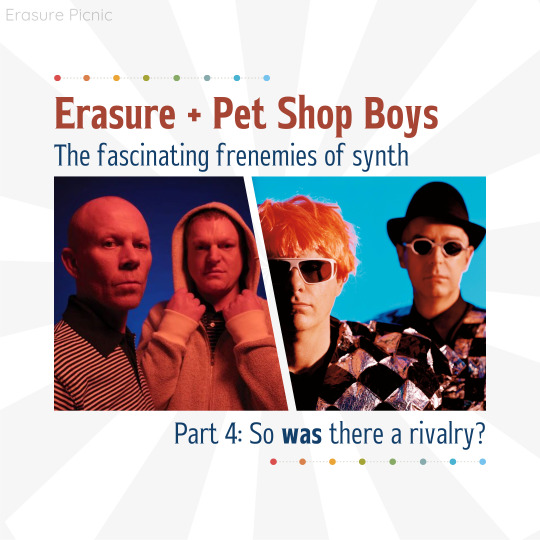
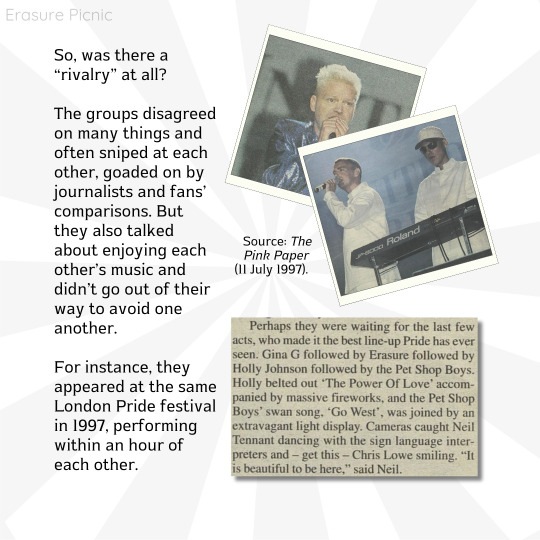
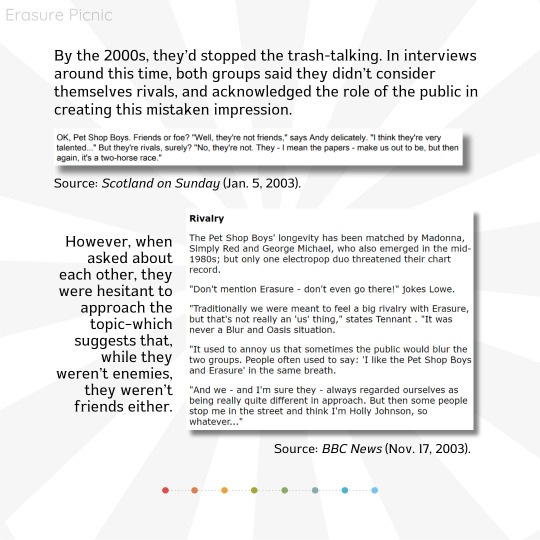
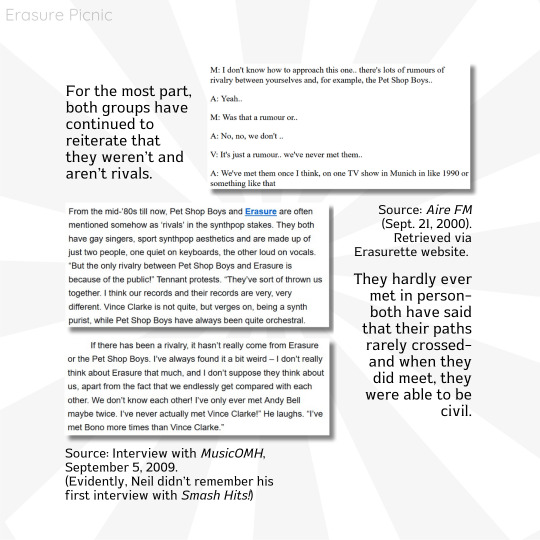
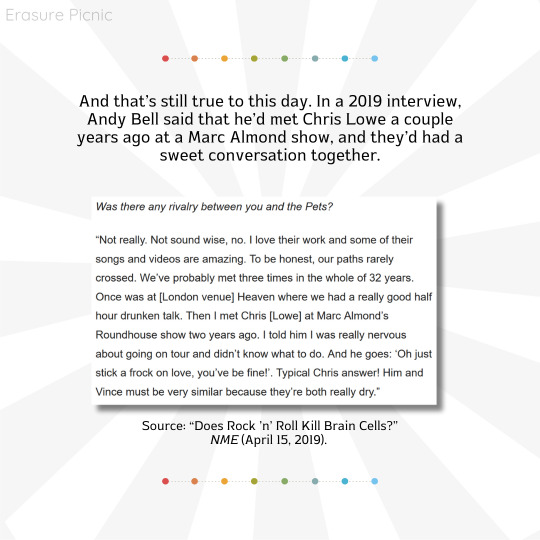

We’ve arrived at the final post in the Pet Shop Boys/Erasure “rivalry” series. I hope you’ve enjoyed the ride!
So, was there a “rivalry” at all? The two groups disagreed on a lot of things and made their fair share of snippy comments about each other, goaded on by journalists and fans’ comparisons. But they also talked about enjoying each other’s music and didn’t go out of their way to avoid one another. For instance, they appeared at the same London Pride festival in 1997, performing within an hour of each other.
By the 2000s, they’d stopped the trash-talking. In interviews around this time, both groups said they didn’t consider themselves rivals, and acknowledged the role of the public in creating this mistaken impression. However, when asked about each other, they were hesitant to approach the topic–which suggests that, while they weren’t enemies, they weren’t friends either.
For the most part, both groups have continued to reiterate that they weren’t and aren’t rivals. They hardly ever met in person–both have said that their paths rarely crossed–and when they did meet, they were able to be civil. And that’s still true to this day. In a 2019 interview, Andy Bell said that he’d met Chris Lowe a couple years ago at a Marc Almond show, and Chris had cracked a gentle joke, even calling Andy “love” as he did. It seems there are no hard feelings between the two bands.
My thoughts? The rivalry was mostly created and sustained by journalists and fans, and the bands themselves played a fairly small role in it. While they weren’t friends, there wasn’t any real hate between them. They may have even found it fun to make all those petty comments.
36 notes
·
View notes
Text
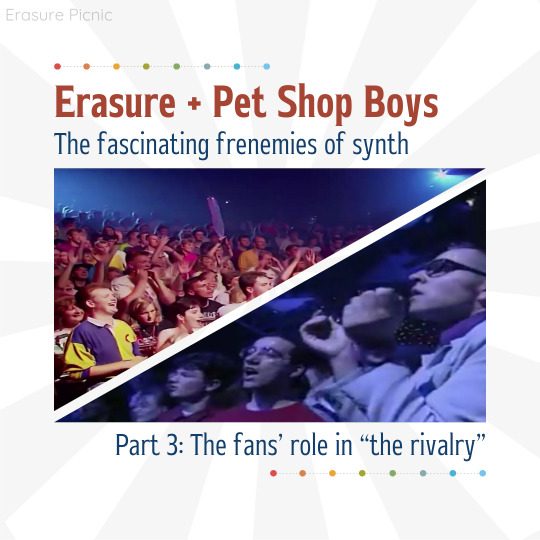

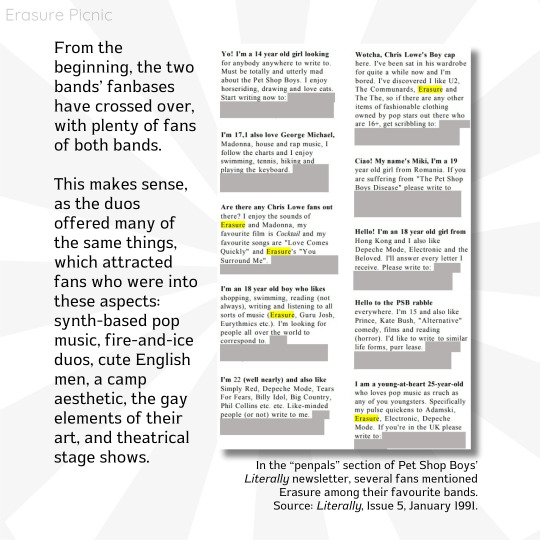
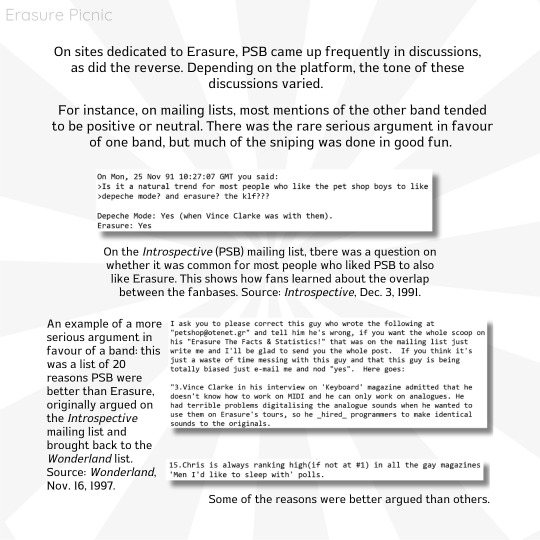

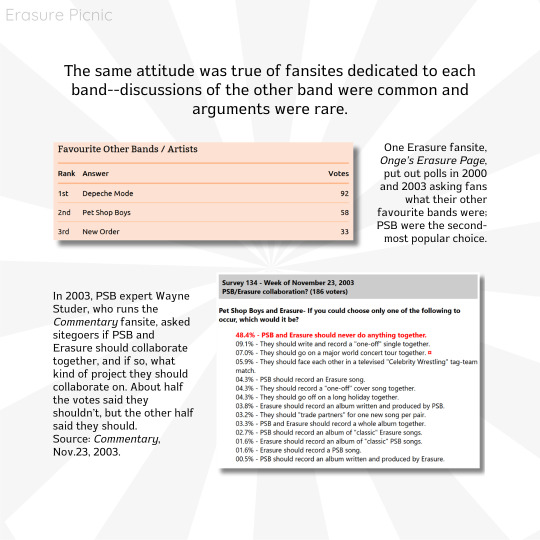




So far, we’ve taken a look at how the “rivalry” started, and examined it from both sides. But what did the fans of Pet Shop Boys and Erasure think of all this? Did they perpetuate the rivalry in their own fanbases? Was it even possible to be a PSB fan AND an Erasure fan?
Let’s start by answering that last question first: yes, it was totally possible. From the beginning, the two bands’ fanbases have crossed over, with plenty of fans of both. In the newsletters for both bands, fans of one duo often mentioned liking the other–for instance, in the “penpals” sections. This makes sense, as the duos offered many of the same things, which attracted fans who were into these aspects: synth-based pop music, fire-and-ice duos, cute English men, a camp aesthetic, the gay elements of their art, and theatrical stage shows.
From what I’ve been able to find out, their fanbases were mostly friendly to each other in the ‘80s. In fact, in many parts of the world, fans weren’t aware of the “rivalry” between the two bands. They didn’t have access to the magazines, newsletters, and videos that tracked the bands’ comments on each other. In some areas, it wasn’t even easy to find electronic music, which was an underground genre. If you were into that kind of music, you tended to like all the big groups from that genre, Erasure and PSB included.
So how did fans become aware of the “rivalry”? Often, it was through talking with other fans. This was made much easier in the ‘90s, with the new forms of telecommunication that were emerging. In this decade, mailing lists, fansites, and newsgroups were all created for the two bands, allowing fans to chat with each other–and to argue, too. The “rivalry” was indeed perpetuated by fans, and some thought it was also started by them. More on that later.
On media dedicated to Erasure, PSB came up frequently in discussions, as did the reverse. Depending on the platform, the tone of these discussions varied. For instance, on mailing lists, most mentions of the other band tended to be positive or neutral. There was the rare serious argument in favour of one band, but much of the sniping was done in good fun.
The same was true of fansites. One Erasure fansite, Onge’s Erasure Page, put out polls in 2000 and 2003 asking fans what their other favourite bands were; PSB were the second-most popular choice (the first was Depeche Mode). A PSB fansite, Commentary, put out its own survey in 2003 asking about a collaboration between the two bands. While nearly half voted that they shouldn’t collaborate, half voted that they should. The idea of a collaboration between the two groups had long been talked about in their fandoms. It also came up in Erasure’s Private Ear newsletter in 1997. In a joke article titled “The Future of Erasure”, fans gave their ideas as to what the future of the band could look like - including TWO Pet Shop Boys collaborations, one in 2005 and another in 2025.
However, on newsgroups, it was a different story. Mentions of the other band were more likely to be negative, and there were lots more inflammatory comments. Why was this the case? Newsgroups were much more public than mailing lists or websites, making it easier to start arguments. With mailing lists, they were moderated, and people had to sign up with their emails. But they didn’t need to do that with the band-specific newsgroups. Because these were under the “alt” hierarchy, which had no rules and no moderation, all people needed to do was to connect to Usenet and start posting. This made it incredibly easy for people who weren’t fans to post mean comments to a newsgroup based on a particular band.
By the end of the 2000s, the first social media platforms, like Twitter and Facebook, had started to gain traction with the public. People on these platforms have kept the “rivalry” alive by joking, jibing, and posting memes–and still do to this day. There was an interesting discussion about the fans’ side of the rivalry on Facebook, where some people suggested that it started with fans. Most said they liked both bands and they didn’t feel the need to debate who was better.
In the final segment, we’ll examine the denouement in the late 90s and 2000s, looking at the bands’ comments on the “rivalry” and each other after the animosity had died down.
23 notes
·
View notes
Text
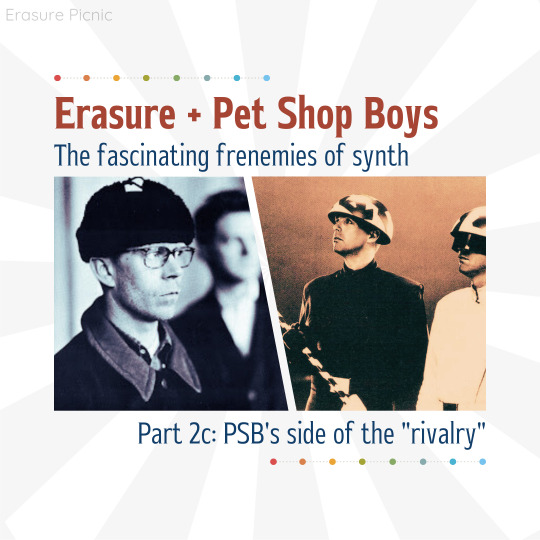
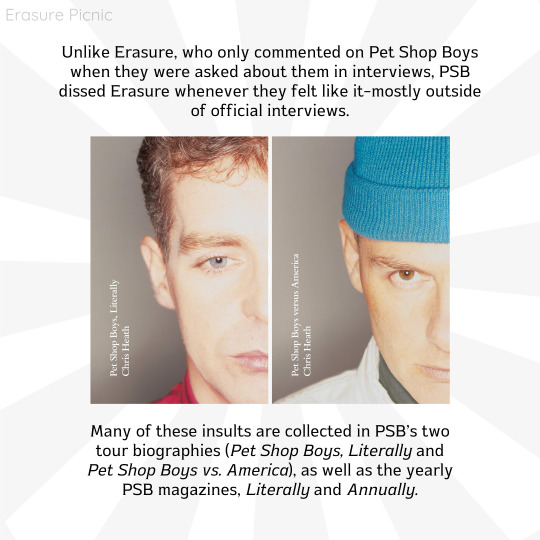

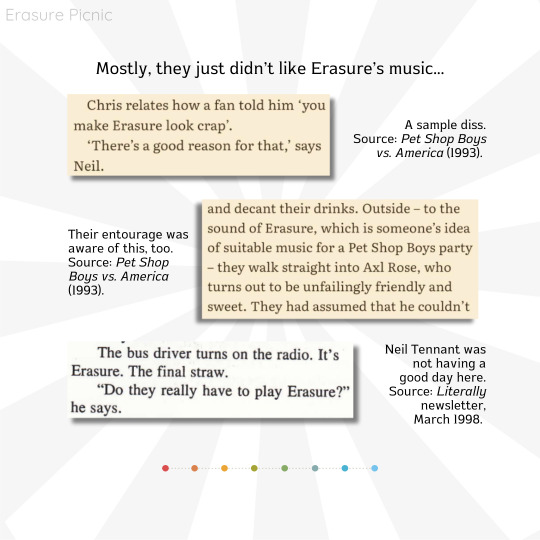
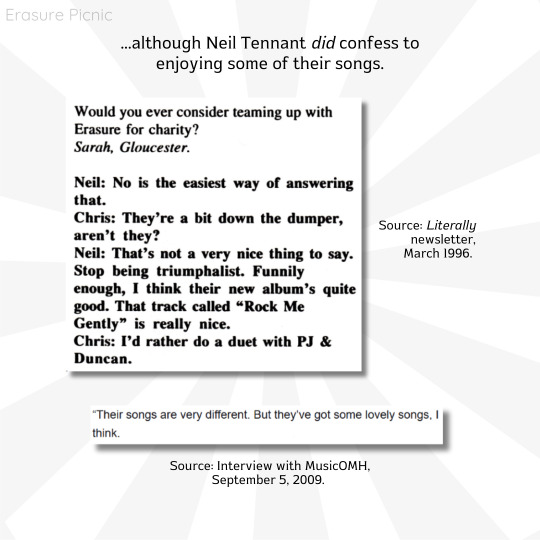

This post covers Pet Shop Boys' side of the "rivalry" between them and Erasure.
Unlike Erasure, who only commented on PSB when they were asked about them in interviews, PSB dissed Erasure whenever they felt like it–mostly outside of official interviews. Many of the insults are collected in their two tour biographies (Pet Shop Boys, Literally and Pet Shop Boys vs. America), as well as the yearly PSB magazine/newsletters, Literally and Annually.
Apart from Neil Tennant’s “role model” diss from the last post, these were cheeky, offhand jabs. None of them were especially vicious, or carried any real hint of hate on PSB’s part. Mostly, they just didn’t like Erasure’s music (although Neil Tennant did confess to enjoying some of their songs). And I wasn’t able to find many insults after all, leading me to believe that the “rivalry” was largely a creation of journalists. (If you know of any more examples of PSB dissing Erasure, please send them to me!)
By the 2000s, PSB and Erasure had stopped dissing each other. However, comedians Matt Lucas and David Walliams (who worked with PSB on their video “I’m With Stupid”) found they could still get a rise out of them by teasing them about Erasure. Videos can be found in this post and that post :)
(Special thanks to @mynameissiduri for the clippings from Pet Shop Boys vs. America!)
24 notes
·
View notes
Text
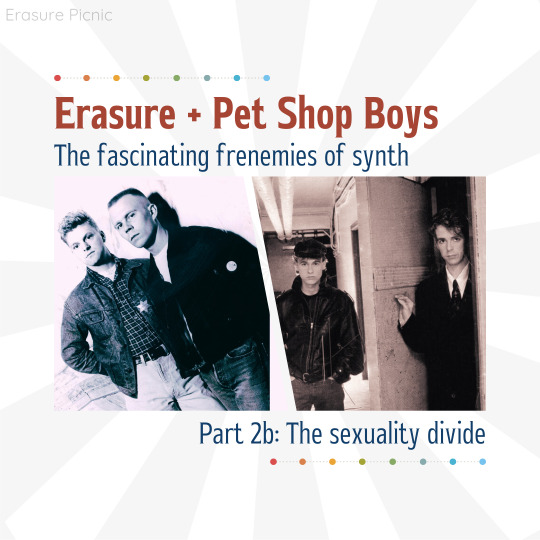
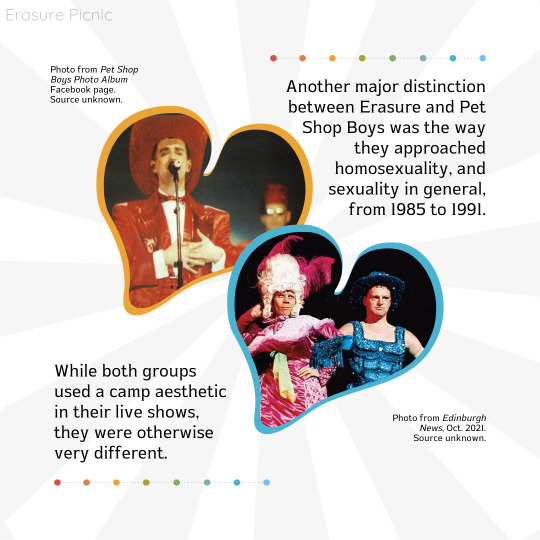





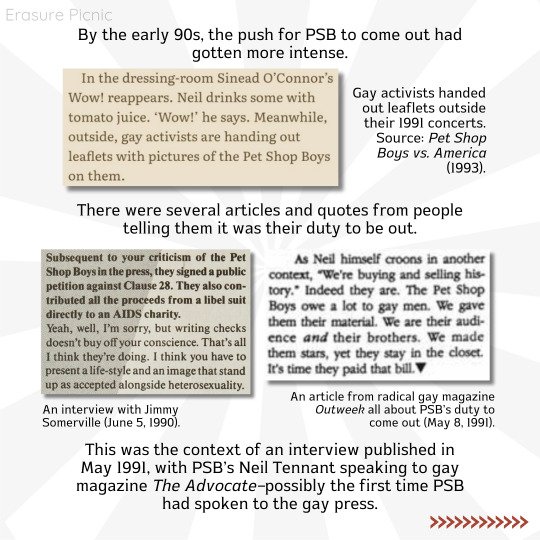
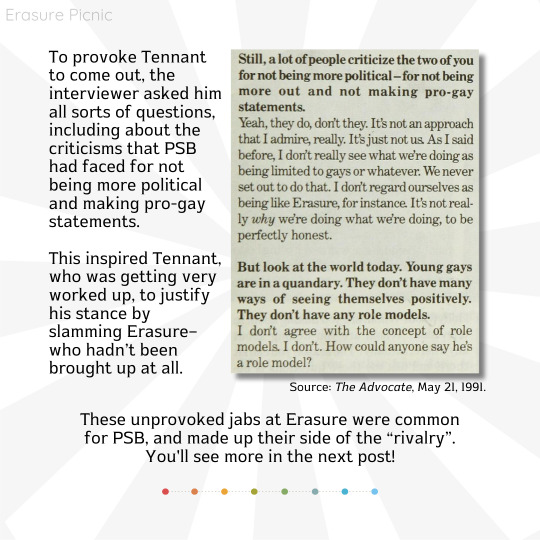
This post will cover the difference in Erasure and Pet Shop Boys’ approaches to sexuality, and how this inspired feelings of animosity between them.
Another major difference between Erasure and Pet Shop Boys was the way they approached homosexuality, and sexuality in general, from 1985 to 1991. While both groups employed a camp aesthetic in their stage shows, they were otherwise very different.
From the start, Erasure were open about their sexualities: one of them was gay and the other was straight. Andy Bell discussed being gay in interviews with all sorts of publications, and was happy to answer questions on the topic. He felt that it was important for musicians to take a stance, and told Seventeen that “being gay and open about it is my substance”. Erasure also supported gay causes more visibly. They played at Pride events, contributed to AIDS fundraisers, gave interviews to the gay press, and spoke out against homophobia, along with bigotry of all kinds.
By contrast, PSB sidestepped questions about their sexualities, and were dismissive when asked directly about the subject. Throughout the 80s, they refused to discuss their “sex lives”, or use the word “gay” to describe themselves. According to some sources, they also avoided speaking to gay journalists, or only did so on the condition that they wouldn’t be asked about their private lives. They saw themselves as musicians, not activists, and objected to the idea of being “role models”. And apart from their appearance at “Before the Act” (an anti-Clause 28 benefit show), they almost never supported gay causes in the public eye. In fact, they often criticized artists who championed social causes.
Writers picked up on the differences in the two bands’ approaches. As early as 1987, they began comparing the groups on this front. At the same time, some gay artists and activists were frustrated by PSB’s silence on their sexualities, and pushed them to come out. Bell was one of those frustrated people, but he was also more sympathetic to PSB than some of their critics. When he talked about PSB to The Advocate in 1988, he acknowledged their fear and believed that they were loosening up on the subject.
By the early 90s, the push for PSB to come out had gotten more intense. Outside their April 1991 concert in Salt Lake City, gay activists handed out leaflets with PSB’s images on them, and there were several articles and quotes from people telling them it was their duty to be out.
This was the context of an interview published in May 1991, with PSB’s Neil Tennant speaking to gay magazine The Advocate–possibly the first time PSB had spoken to the gay press. To provoke Tennant to come out, the interviewer (Richard Laermer) asked him all sorts of questions, including about the criticisms that PSB had faced for not being more political and making pro-gay statements. Tennant said he didn’t admire that approach, and didn’t see PSB’s music as being limited to gays–and then added, “I don’t regard ourselves as being like Erasure.” Laermer hadn’t brought up Erasure at all.
When Laermer challenged him on his words, arguing that young gays were in need of role models, Tennant, who was getting very worked up, fired back, “I don’t agree with the concept of role models. I don’t. How could anyone say he’s a role model?” He was likely referring to Bell–who had never called himself a role model, but had been far more outspoken than PSB about gay causes and the need to come out.
These unprovoked jabs at Erasure were common for PSB, and made up their side of the “rivalry”. In the next post, we’ll examine their side, plus the ways the “rivalry” played out in bands’ fanbases.
29 notes
·
View notes
Text
The second of two Erasure-related jibes at PSB, from comedian David Walliams on Never Mind the Buzzcocks.
(source)
20 notes
·
View notes
Text
The first of two Erasure-related jibes at PSB, from comedians Matt Lucas and David Walliams.
(source)
10 notes
·
View notes
Text

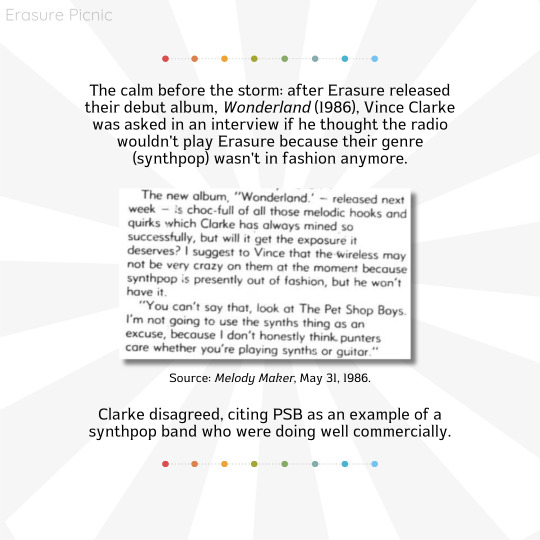

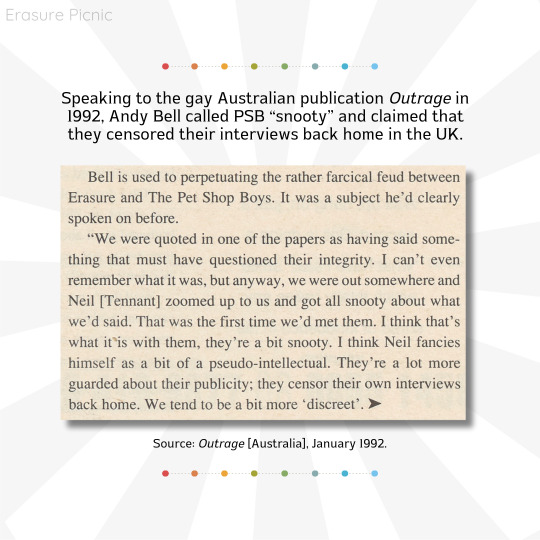

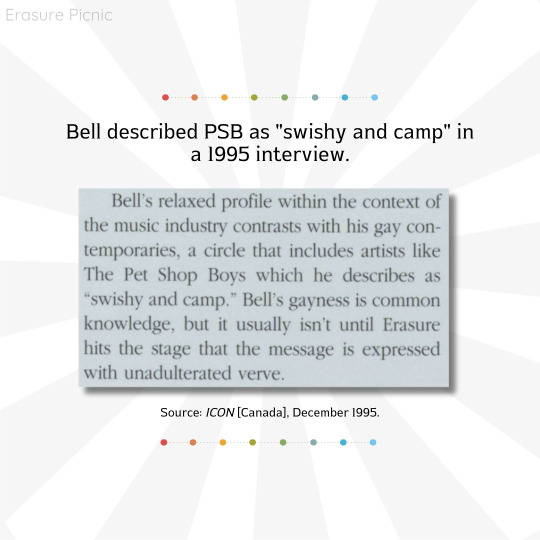
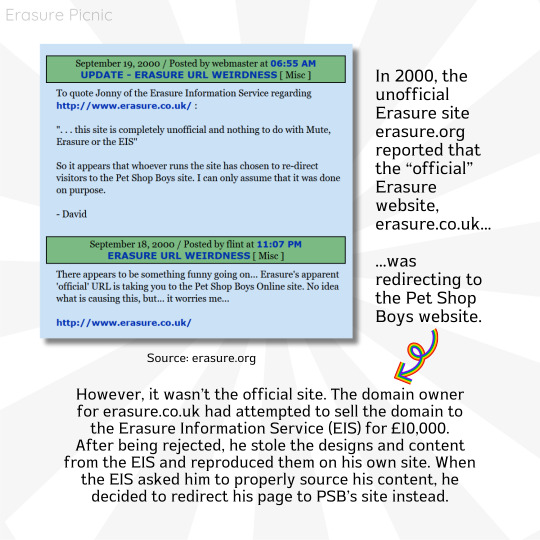
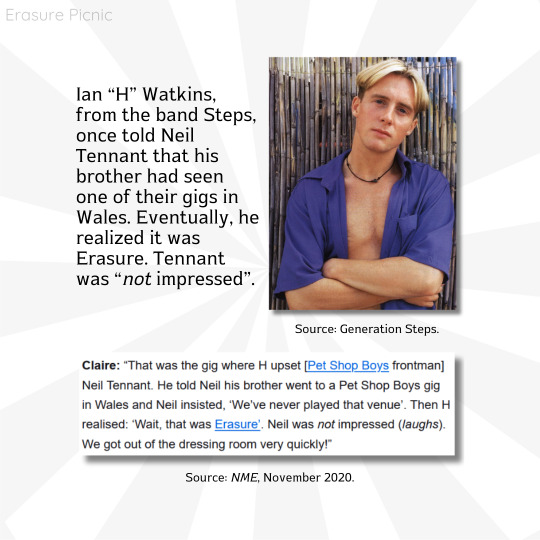

You may have thought the PSB vs. Erasure series was over - but there’s more! I collected some tidbits that either couldn’t fit in the original series, or that I’d found after the last post. So here’s part 5!
After Erasure released their debut album, Clarke was asked in an interview if he thought the radio wouldn't play Erasure because their genre (synthpop) wasn't in fashion anymore. He disagreed, citing PSB as an example of a synthpop band who were doing well.
Source: Melody Maker, May 31, 1986.
In August 1991, PSB did a stint as radio DJs on BBC Radio One, playing a surprisingly wide variety of artists. There were only two artists they wouldn’t play: Deacon Blue…and Erasure. (However, one of the songs they played–a 20-minute megamix by 808 State–sampled “Just Can’t Get Enough”, a song written by Vince Clarke!)
Source: Literally, Nov. 1991.
Speaking to Outrage in 1992, Bell called PSB “snooty” and said they censored their interviews in the UK.
Source: Outrage [Australia], Jan. 1992.
In 1994, Neil Tennant claimed that PSB weren't a 'perv' pop duo– “that’s more like Erasure.” (A decade earlier, in his career at Smash Hits, Tennant had coined the term ‘pervy synth duo’ to refer to Eurythmics.)
Source: Vox, Jan. 1, 1994.
Bell described PSB as "swishy and camp" in a 1995 interview.
Source: ICON, Dec. 1995.
In 2000, the unofficial Erasure site erasure.org reported that the “official” Erasure website, erasure.co.uk, was redirecting to the PSB website. However, it wasn’t the official site. The domain owner for erasure.co.uk had failed to sell the domain to the Erasure Information Service (EIS) for £10,000. After being rejected, he stole the designs and content from the EIS and reproduced them on his own site. When the EIS asked him to properly source his content, he decided to redirect his page to PSB’s site instead.
Ian “H” Watkins from the band Steps once told Neil Tennant that his brother had seen one of their gigs in Wales. Eventually, he realized it was Erasure. Tennant was “not impressed”.
Source: NME, Nov. 2020.
In 2019, Bell went back on his word–he told journalist Steve Pafford that Erasure and PSB WERE rivals!
Source: Stevepafford.com, Jun. 5, 2020.
#erasure#erasure band#vince clarke#andy bell#pet shop boys#pet shop boys vs erasure#neil tennant#chris lowe
17 notes
·
View notes